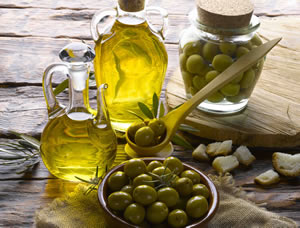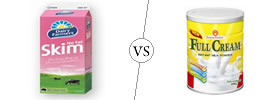Difference between Olive Oil and Canola Oil
Key difference: As their name clearly suggests, Olive oil is obtained from the crushed olives, which is a fruit; whereas Canola oil is obtained from several kinds of rapeseed plants.
Olive and canola oils are different types of oil which are used as a source of basic ingredients in cooking and baking. As per their names, olive oils are made up of olive seeds or fruits with different types. These types are categorized according to their extraction processes. While, canola oil is obtained from the hybrid rapeseed plant, and its invention was done in Canada, hence the oil was also known by “Canadian oil”.
The two oils are totally different from each other in terms of production. Olive oil is produced by pressing the olive seeds in a cold temperature; this is done in order to maintain the nutritional integrity of the oil. Whereas, the canola oil is degumed, deodorized, bleached and further refined at high temperatures at the time of production. The high temperature helps the oil to increase the trans fatty acids and saturated fats concentration. Both the oils are rich in their respective nutritive contents.
 Olive oil is rich in its nutritive content and is beneficial in many health issues and factors. The oil exists in three different types, grades or uses which are classified according to their method of extraction, they are:
Olive oil is rich in its nutritive content and is beneficial in many health issues and factors. The oil exists in three different types, grades or uses which are classified according to their method of extraction, they are:
- Extra Virgin olive oil- comes from the first pressing of the olives;
- Virgin Olive oil - oil does not undergo any refinement;
- Olive oil - it’s a blend of virgin olive oil and lower-quality refined olive oil;
- Olive Pomace oil - this is very refined olive oil, obtained from the residue that remains once the oil is pressed.
These oils are of particular flavor texture and shelf-life makes them more useful in different applications like, human direct consumption on bread, or salads; also applicable in the indirect consumption in domestic cooking and catering, along with the industrial uses such as animal feed or engineering. Other than these uses, the oil also has greater applications in cooking, cosmetics, pharmaceuticals, soaps and as fuel for traditional oil lamps.
 Canola oil is obtained from the rapeseeds Brassica campestris (Brassica napus L. and B. campestris L.). The seeds are actually bitter in taste, but the oil extracted during the manufacturing processes removes the taste and hence makes the oil bitter-free. The oil is obtained after a long process of precipitation and organic acid treatments. The canola oil contains low levels of saturated fats; but has a desirable high amount of monounsaturated fats. The American Society for Reproductive Medicine recommended that the canola oil is regarded to be the fertility-preserving vaginal lubricant. Recently, the studies have also been conducted to utilize the oil for reducing the growth of cancer cells. Along with these applications, the oil is also used in the form of industrial lubricants, bio-fuels, candles, lipsticks, and newspaper inks depending on the price on the spot market.
Canola oil is obtained from the rapeseeds Brassica campestris (Brassica napus L. and B. campestris L.). The seeds are actually bitter in taste, but the oil extracted during the manufacturing processes removes the taste and hence makes the oil bitter-free. The oil is obtained after a long process of precipitation and organic acid treatments. The canola oil contains low levels of saturated fats; but has a desirable high amount of monounsaturated fats. The American Society for Reproductive Medicine recommended that the canola oil is regarded to be the fertility-preserving vaginal lubricant. Recently, the studies have also been conducted to utilize the oil for reducing the growth of cancer cells. Along with these applications, the oil is also used in the form of industrial lubricants, bio-fuels, candles, lipsticks, and newspaper inks depending on the price on the spot market.
In comparison of health, olive oil is regarded as best, because of its extra-virgin type, which contains antioxidants, polyphenols and omega-3 fatty acids. These have the ability to promote the cardiovascular health and cognitive function, they can boost the human immune system and they can also protect the body from many types of cancer. Along with these, the oil is known for it's anti-inflammatory properties, and acts as a beneficial to reduce the diseases like arthritis and osteoporosis. Canola oil on the other hand is regarded to be beneficial to the coronary related issues. The oil is generally low in saturated fats, but high in omega-3 fatty acids and other monounsaturated fats that helps it to promote the healthy cardiovascular functions.
Hence if judged accordingly, then the olive oil ranks first in terms of benefits than that of the canola oil.
Comparison between Olive Oil and Canola Oil:
|
|
Olive Oil |
Canola Oil |
|
Obtained from |
olives which is considered as a fruit |
rapeseed which is a pure seed |
|
Method obtained |
pressed mostly in cold temperature |
by mechanical process at high temperatures |
|
Applicable in |
cooking, skin care, hair care, medicines, religious practices in some regions |
cooking, as bio-diesel, , candles, lipsticks, and newspaper inks |
|
Fat Compositions |
|
|
|
Specially used in |
cold/raw for salad dressing or with bread; light/pure for sauteing and frying |
saute, shallow fry, deep fry |
|
Health Benefits |
|
|
Image Courtesy: greatitalianfoodtrade.com, vegetableoils.org









Add new comment